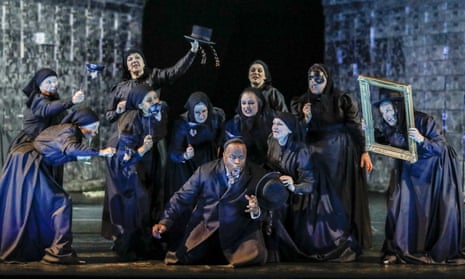André Tchaikowsky’s lifestory is almost worthy of opera, the end necessarily tragic. So it’s perhaps not surprising that, in his hands, Shakespeare’s The Merchant of Venice should emerge as more tragedy than comedy, with Tchaikowsky painting something of himself – depressive, gay and Jewish – into the characters of both merchant Antonio, manifestly in love with Bassanio, and the money-lending Shylock.
In Keith Warner’s production – first seen at Bregenz in 2013 and now getting its UK premiere in Welsh National Opera’s Shakespeare-themed season – Antonio is not alone in his blatant anti-semitism, and casting of the African American, Lester Lynch, as Shylock gives a further racist edge. For some, this treatment will only fuel the perception of a problematic play, better avoided, yet the baiting and the venom to which Warner subjects Shylock carry a deliberately shocking contemporary resonance.
Tchaikowsky’s music presents a curious mixture of styles, primarily nervily Bergian but with Brittenesque passages too, notably in the brass writing; recorder and lute feature in cod-Renaissance music from a stage band accompanying a Marlene Dietrich singer in white top and tails. Britten’s acuity of word-setting is lacking, though, and Tchaikowsky’s tendency to use the spoken word at points of high tension diminishes rather than heightens their impact.

From the outset, Ashley Martin-Davis’s design achieves a steely clarity and his costumes have an early Edwardian primness. The melancholic Antonio is seen on the psychiatrist’s couch: what appear to be closets behind him are revealed as safes, all of a piece with the two massive walls of bank deposit boxes on either side. While there’s no doubting that this is about money and the price of love, the contrast with the vaudeville, far-from-coy cavorting at Portia’s Belmont, prompted by Tchaikowsky’s quirky musical quotes, is awkward. The third act veers back to solemn/tragic, with horror-movie musical moments, and when the brutal treatment meted out at the trial appears to leave Shylock for dead, kicked to the floor, the opera could have ended there. Instead, as an interminable elegiac orchestral entr’acte leads to an apologia of an epilogue – the couples all loved-up against a full moon and Shylock a mere shadow – the dramatic energy saps away.
Lynch’s rich baritone and vivid acting realises a compelling Shylock, his “Hath not a Jew eyes?” stilled the auditorium. By comparison, Martin Wölfel is a fatally weak Antonio, his countertenor only rarely projecting with any force and outsung by Marc Le Brocq’s strong Bassanio. Their past relationship is ostensibly balanced by the brief Sapphic frolic given to Verena Gunz’s Nerissa and Sarah Castle’s Portia, the latter’s mezzo taking a while to get into focus, but making her vocal mark in the Judge disguise. Across the large cast, ensemble work is tight and conductor Lionel Friend is a sure hand in the pit. Ultimately, this Merchant of Venice is neither operatic gold nor base lead; nevertheless, for its discomfiting reminder that such prejudice is not history, it’s a staging which should be seen.

Comments (…)
Sign in or create your Guardian account to join the discussion